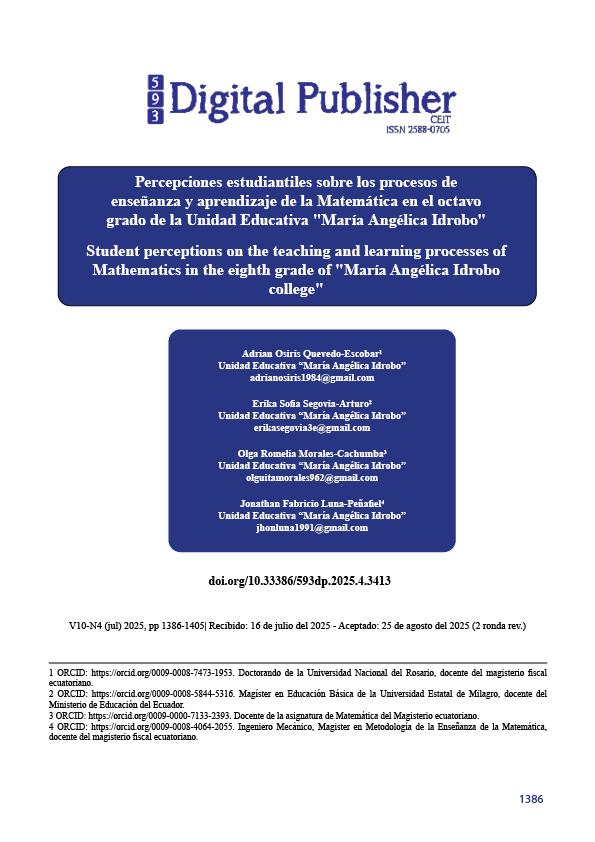Student perceptions on the teaching and learning processes of Mathematics in the eighth grade of "María Angélica Idrobo college"
Main Article Content
Abstract
This study focuses on the perception that eighth-grade students of the "María Angélica Idrobo" Educational Unit in the city of Quito have of the teaching and learning processes of mathematics. To this end, a structured questionnaire was used directed at all eighth-grade classes, which allowed for the examination of various aspects such as the perception of learning, clarity in explanations, understanding of content, use of teaching resources, evaluation, the relationship between teachers and students, as well as overall satisfaction. A comparative analysis was conducted to detect significant differences among the teachers, whose findings reveal that, although most students appreciate their learning, concerns arise regarding the variations in the pedagogical approaches used. Classes based on the traditional model of 'expository block-observation' were considered less effective, as it was perceived that 'less was learned and less was enjoyed' compared to methodologies that are more active, contextualized, and participatory. Among the main strengths that could enhance performance and motivation are clear explanations, appropriate use of resources, formative assessment, and empathetic interpersonal relationships. The research concludes that students' perceptions are essential for providing feedback to teachers and ensuring quality in educational processes. It also emphasizes the urgent need to establish more inclusive and student-oriented pedagogical practices, optimize teacher training in the teaching of Mathematics, and promote socio-emotional competencies.
Downloads
Article Details

This work is licensed under a Creative Commons Attribution-NonCommercial-ShareAlike 4.0 International License.
1. Derechos de autor
Las obras que se publican en 593 Digital Publisher CEIT están sujetas a los siguientes términos:
1.1. 593 Digital Publisher CEIT, conserva los derechos patrimoniales (copyright) de las obras publicadas, favorece y permite la reutilización de las mismas bajo la licencia Licencia Creative Commons 4.0 de Reconocimiento-NoComercial-CompartirIgual 4.0, por lo cual se pueden copiar, usar, difundir, transmitir y exponer públicamente, siempre que:
1.1.a. Se cite la autoría y fuente original de su publicación (revista, editorial, URL).
1.1.b. No se usen para fines comerciales u onerosos.
1.1.c. Se mencione la existencia y especificaciones de esta licencia de uso.
References
Aparicio, A. (2017). Creencias y actitudes hacia la matemática en estudiantes de educación básica. Revista Educación Matemática, 29(1), 45–62. https://doi.org/10.24844/EM2901.03
Area, M. (2010). La integración de las TIC en el currículo escolar. Ediciones CEPE. Madrid, España.
Ashcraft, M. H. (2002). Math anxiety: Personal, educational, and cognitive consequences. Current Directions in Psychological Science, 11(5), 181–185. https://doi.org/10.1111/1467-8721.00196
Ausubel, D. P. (2002). Psicología educativa. Un punto de vista cognoscitivo. Trillas. Ciudad de México, México.
Bandura, A. (1997). Self-efficacy: The exercise of control. W. H. Freeman. New York, EE. UU.
Black, P., & Wiliam, D. (1998). Assessment and classroom learning. Assessment in Education: Principles, Policy & Practice, 5(1), 7–74. https://doi.org/10.1080/0969595980050102
Bishop, A. J. (2008). Mathematics education in its cultural context. Springer. New York, EE. UU. https://doi.org/10.1007/978-0-387-09465-0
Boaler, J. (2002). Experiencing school mathematics: Traditional and reform approaches to teaching and their impact on student learning (rev. ed.). Routledge. London, Reino Unido. https://doi.org/10.4324/9781410606289
Boaler, J. (2016). Mathematical mindsets: Unleashing students’ potential through creative math, inspiring messages and innovative teaching. Jossey-Bass. San Francisco, EE. UU.
Brousseau, G. (1997). Theory of didactical situations in mathematics. Kluwer Academic Publishers. Dordrecht, Países Bajos.
Camilloni, A. R. (2007). Corrientes didácticas contemporáneas. Paidós. Buenos Aires, Argentina.
Camilloni, A., Celman, S., Litwin, E., & Palou de Maté, S. (2007). Corrientes pedagógicas contemporáneas. Paidós. Buenos Aires, Argentina.
Freire, P. (1970). Pedagogía del oprimido. Siglo XXI Editores. Ciudad de México, México.
Freire, P. (1996). Pedagogía de la autonomía: Saberes necesarios para la práctica educativa. Siglo XXI Editores. Ciudad de México, México.
Godino, J. D. (2003). Marco epistemológico y metodológico para la investigación en didáctica de la matemática. Universidad de Granada, Departamento de Didáctica de la Matemática. Granada, España.
Godino, J. D., & Batanero, C. (1994). Didáctica de la estadística. Universidad de Granada, Departamento de Didáctica de la Matemática. Granada, España.
Godino, J. D., & Batanero, C. (1998). Clarifying the meaning of mathematical objects as a priority area of research in mathematics education. In A. Sierpinska & J. Kilpatrick (Eds.), Mathematics education as a research domain: A search for identity (pp. 177–195). Springer. Dordrecht, Países Bajos. https://doi.org/10.1007/978-94-011-5190-8_10
Hattie, J. (2009). Visible learning: A synthesis of over 800 meta-analyses relating to achievement. Routledge. London, Reino Unido. https://doi.org/10.4324/9780203887332
Immordino-Yang, M. H., & Damasio, A. (2007). We feel, therefore we learn: The relevance of affective and social neuroscience to education. Mind, Brain, and Education, 1(1), 3–10. https://doi.org/10.1111/j.1751-228X.2007.00004.x
López, J., & Espinoza, P. (2021). Innovación didáctica en la enseñanza de la matemática en América Latina: Un estudio comparado. Revista Latinoamericana de Investigación Educativa, 21(2), 55–78. https://doi.org/10.17151/rlei.2021.21.2.4
Martínez, M. (2006). Motivación y satisfacción en contextos educativos. Graó. Barcelona, España.
Martínez-Padrón, O., & Rico, L. (2018). Ansiedad matemática: una revisión de sus causas y consecuencias en el aprendizaje. Revista de Educación Matemática, 33(1), 89–110.
Monzón, A. (2019). Percepción de estudiantes de secundaria sobre la enseñanza de la matemática. Revista Educación y Sociedad, 21(2), 95–112*. https://doi.org/10.15359/eys.21-2.6
Monzón, M. (2019). Estrategias didácticas innovadoras en la enseñanza de la matemática. Revista Iberoamericana de Educación, 79(2), 65–84. https://doi.org/10.35362/rie7923398
Organización de Estados Iberoamericanos [OEI]. (2020). Estado de la educación en Iberoamérica: Informe 2020. OEI. Madrid, España. https://oei.int/publicaciones
Pajares, F., & Graham, L. (1999). Self-efficacy, motivation constructs, and mathematics performance of entering middle school students. Contemporary Educational Psychology, 24(2), 124–139. https://doi.org/10.1006/ceps.1998.0991
Pianta, R. C., Hamre, B. K., & Allen, J. P. (2012). Teacher-student relationships and engagement: Conceptualizing, measuring, and improving the capacity of classroom interactions. In S. L. Christenson, A. L. Reschly, & C. Wylie (Eds.), Handbook of research on student engagement (pp. 365–386). Springer. Boston, EE. UU.
Pintrich, P. R., & De Groot, E. V. (1990). Motivational and self-regulated learning components of classroom academic performance. Journal of Educational Psychology, 82(1), 33–40. https://doi.org/10.1037/0022-0663.82.1.33
Pozo, J. I. (2006). La nueva cultura del aprendizaje. Claves para reinventar la educación. Alianza Editorial. Madrid, España.
Rico, L. (1997). La educación matemática en la enseñanza secundaria. Horsori. Barcelona, España.
Salinas, J. (2012). Innovación educativa y uso de las TIC. Revista Universidad y Sociedad del Conocimiento, 9(2), 1–10. https://doi.org/10.7238/rusc.v9i2.1177
Schoenfeld, A. H. (2002). How we think: A theory of goal-oriented decision making and its educational applications. Routledge. London, Reino Unido.
Schoenfeld, A. H. (2016). Learning to think mathematically: Problem solving, metacognition, and sense-making in mathematics. Journal of Education, 196(2), 1–38. https://doi.org/10.1177/002205741619600202
Schunk, D. H., Pintrich, P. R., & Meece, J. L. (2014). Motivación en el aula: Teoría, investigación y práctica. Pearson Educación. Madrid, España.
Soto, D., & García, C. (2020). Clima de aula y estrategias didácticas en el aprendizaje de las matemáticas. Revista Iberoamericana de Educación, 84(2), 45–62. https://doi.org/10.35362/rie8423681
Tobón, S. (2010). Evaluación de competencias: Pensamiento complejo, currículo y evaluación. Ecoe Ediciones. Bogotá, Colombia.
UNESCO. (2020). Marco de competencias de los docentes en materia de TIC. UNESCO. París, Francia.
UNESCO. (2021). Reimaginar juntos nuestros futuros: Un nuevo contrato social para la educación. UNESCO. París, Francia. https://unesdoc.unesco.org/ark:/48223/pf0000379707
UNESCO. (2021). Informe regional comparativo y explicativo (ERCE 2019): Logros de aprendizaje y factores asociados en América Latina y el Caribe. UNESCO. Santiago, Chile. https://unesdoc.unesco.org/ark:/48223/pf0000377194
Vygotsky, L. S. (1978). El desarrollo de los procesos psicológicos superiores. Crítica. Barcelona, España.
Zabala, A., & Arnau, L. (2007). 11 ideas clave. Cómo aprender y enseñar competencias. Graó. Barcelona, España.





